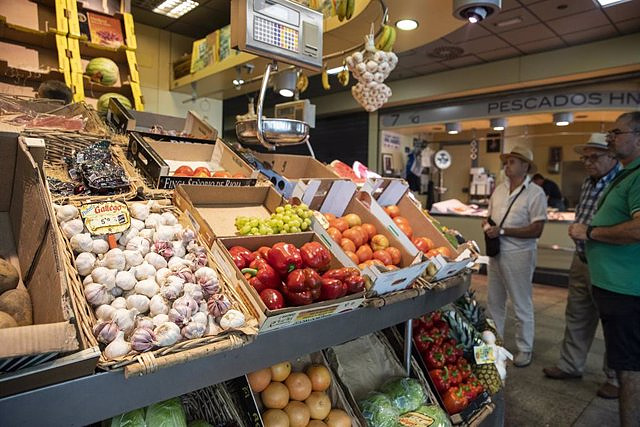"The price of food has not peaked", according to the general director of Economy and Statistics of the organization
MADRID, 22 Mar. (EUROPA PRESS) -
The Bank of Spain has revised upwards its average inflation forecast for food for 2023, from the 7.8% forecast last December to the 12.2% estimated now, as explained by the General Director of Economy and Statistics of the Bank of Spain, Ángel Gavilán.
On the occasion of the publication of its latest quarterly report on the Spanish economy, the institution has highlighted that the behavior of inflation at the beginning of 2023 has been marked by the measures implemented by the Government to contain the rise in prices, such as the VAT reduction for certain foods.
The agency calculates that in January this VAT reduction subtracted two tenths from general inflation. "This is consistent with a transfer of approximately 90% of the tax reduction to consumer prices, which is maintained in February," explained Gavilán.
It must be taken into account that the contribution of food to the general inflation rate in Spain is somewhat higher than in the euro area, due to its greater weight in the consumption basket of Spanish households -25.1% in 2022 compared to the 20.9%--.
In addition, according to the organization, the recent rise in food prices reflects the gradual transfer to prices of the cost increases that producers have experienced in recent quarters. "The price of food has not peaked", has assured the director of Economy and Statistics of the Bank of Spain.
Looking ahead to 2024, the Bank of Spain calculates that the average for food inflation would be 4.6%, compared to the 2.6% estimated in the last report, while in 2025 it would reach 2.9% --versus the 3.3% previously forecast--.
While the VAT reduction on some foods subtracted two tenths of a point from the general CPI for January, the suppression of the universal rebate on fuels added about seven tenths of a point to inflation, according to the institution.
At the same time, the Bank of Spain calculates that the incorporation of the part related to the free market in the measurement of gas and electricity prices carried out by the National Institute of Statistics (INE) added about four tenths to the CPI for January , while the annual revision of the weightings in the goods and services that make up the shopping basket added around three tenths.
Without the methodological change applied by the INE, "which has conditioned the behavior of clothing and footwear prices", core inflation "would have remained relatively stable" since mid-2022, according to the institution.
On the other hand, the Bank of Spain perceives a slightly slower transfer than in the past of market interest rates to the cost of new banking operations in Spain.
However, he anticipates that the impact of the rise in interest rates on the average cost of private sector debt -which has been limited up to now- will become more pronounced in the coming months.
In addition, it warns that the rise in rates will affect household consumption, with a heterogeneous intensity depending on the available savings and the type of home ownership.

 Exploring Cardano: Inner Workings and Advantages of this Cryptocurrency
Exploring Cardano: Inner Workings and Advantages of this Cryptocurrency Seville.- Economy.- Innova.- STSA inaugurates its new painting and sealing hangar in San Pablo, for 18 million
Seville.- Economy.- Innova.- STSA inaugurates its new painting and sealing hangar in San Pablo, for 18 million Innova.- More than 300 volunteers join the Andalucía Compromiso Digital network in one month to facilitate access to ICT
Innova.- More than 300 volunteers join the Andalucía Compromiso Digital network in one month to facilitate access to ICT Innova.-AMP.- Ayesa acquires 51% of Sadiel, which will create new technological engineering products and expand markets
Innova.-AMP.- Ayesa acquires 51% of Sadiel, which will create new technological engineering products and expand markets Marc Márquez returns to pole in Jerez
Marc Márquez returns to pole in Jerez The CIS carries out a quick survey on Sánchez's letter to measure the reaction of citizens
The CIS carries out a quick survey on Sánchez's letter to measure the reaction of citizens 12M.- Puigdemont to Sánchez and Illa: "This is not about the future of the PSOE! What have you believed?"
12M.- Puigdemont to Sánchez and Illa: "This is not about the future of the PSOE! What have you believed?" Díaz proclaims that "the Government is not going to bow down" and asks not to be "on the defensive and locked in" against the right
Díaz proclaims that "the Government is not going to bow down" and asks not to be "on the defensive and locked in" against the right How Blockchain in being used to shape the future
How Blockchain in being used to shape the future Not just BTC and ETH: Here Are Some More Interesting Coins Worth Focusing on
Not just BTC and ETH: Here Are Some More Interesting Coins Worth Focusing on UPV students build a prototype of a wooden house to move to Equatorial Guinea
UPV students build a prototype of a wooden house to move to Equatorial Guinea The UA opens the call for the Impulso 2024 Awards for the best innovative business initiatives
The UA opens the call for the Impulso 2024 Awards for the best innovative business initiatives ALI, virtual assistant from Alicante, internationally recognized by the OECD
ALI, virtual assistant from Alicante, internationally recognized by the OECD Retrópolis brings the golden age of video games and computing to the UPV
Retrópolis brings the golden age of video games and computing to the UPV A million people demonstrate in France against Macron's pension reform
A million people demonstrate in France against Macron's pension reform Russia launches several missiles against "critical infrastructure" in the city of Zaporizhia
Russia launches several missiles against "critical infrastructure" in the city of Zaporizhia A "procession" remembers the dead of the Calabria shipwreck as bodies continue to wash up on the shore
A "procession" remembers the dead of the Calabria shipwreck as bodies continue to wash up on the shore Prison sentences handed down for three prominent Hong Kong pro-democracy activists
Prison sentences handed down for three prominent Hong Kong pro-democracy activists ETH continues to leave trading platforms, Ethereum balance on exchanges lowest in 3 years
ETH continues to leave trading platforms, Ethereum balance on exchanges lowest in 3 years Investors invest $450 million in Consensys, Ethereum incubator now valued at $7 billion
Investors invest $450 million in Consensys, Ethereum incubator now valued at $7 billion Alchemy Integrates Ethereum L2 Product Starknet to Enhance Web3 Scalability at a Price 100x Lower Than L1 Fees
Alchemy Integrates Ethereum L2 Product Starknet to Enhance Web3 Scalability at a Price 100x Lower Than L1 Fees Mining Report: Bitcoin's Electricity Consumption Declines by 25% in Q1 2022
Mining Report: Bitcoin's Electricity Consumption Declines by 25% in Q1 2022 Oil-to-Bitcoin Mining Firm Crusoe Energy Systems Raised $505 Million
Oil-to-Bitcoin Mining Firm Crusoe Energy Systems Raised $505 Million Microbt reveals the latest Bitcoin mining rigs -- Machines produce up to 126 TH/s with custom 5nm chip design
Microbt reveals the latest Bitcoin mining rigs -- Machines produce up to 126 TH/s with custom 5nm chip design Bitcoin's Mining Difficulty Hits a Lifetime High, With More Than 90% of BTC Supply Issued
Bitcoin's Mining Difficulty Hits a Lifetime High, With More Than 90% of BTC Supply Issued The Biggest Movers are Near, EOS, and RUNE during Friday's Selloff
The Biggest Movers are Near, EOS, and RUNE during Friday's Selloff Global Markets Spooked by a Hawkish Fed and Covid, Stocks and Crypto Gain After Musk Buys Twitter
Global Markets Spooked by a Hawkish Fed and Covid, Stocks and Crypto Gain After Musk Buys Twitter Bitso to offset carbon emissions from the Trading Platform's ERC20, ETH, and BTC Transactions
Bitso to offset carbon emissions from the Trading Platform's ERC20, ETH, and BTC Transactions Draftkings Announces 2022 College Hoops NFT Selection for March Madness
Draftkings Announces 2022 College Hoops NFT Selection for March Madness























